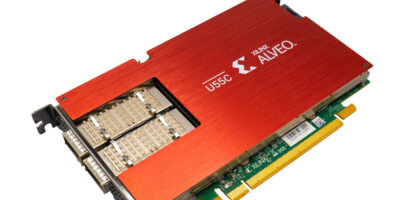Xilinx says Alveo U55C is its most powerful accelerator card
Purpose-built for high performance computing (HPC) and big data workloads, the Aleveo U55C was unveiled by Xilinx at SC21.
The data centre accelerator card was launched alongside a new standards-based, API-driven clustering for deploying FPGAs at massive scale.
The Alveo U55C accelerator is the company’s most powerful Alveo accelerator card to date and offers the highest compute density and HBM capacity in the Alveo accelerator portfolio. Used with Xilinx RoCE v2-based clustering, customers with large-scale compute workloads can now implement powerful FPGA-based HPC clustering using an existing data centre infrastructure and network, says Xilinx.
“Scaling out Alveo compute capabilities to target HPC workloads is now easier, more efficient and more powerful than ever,” said Salil Raje, executive vice president and general manager, Data Center Group at Xilinx. “Architecturally, FPGA-based accelerators like Alveo cards provide the highest performance at the lowest cost for many compute-intensive workloads. By introducing a standards-based methodology that enables the creation of Alveo HPC clusters using a customer’s existing infrastructure and network, we’re delivering those key advantages at massive scale to any data centre,” he said.
The Alveo U55C card delivers more parallelism of data pipelines, superior memory management, optimised data movement throughout the pipeline, and the highest performance-per-watt in the Alveo portfolio.
The single-slot full height, half length (FHHL) form factor card has a low 150W (max) power. It doubles the HBM2 to 16Gbyte compared to its predecessor, the dual-slot Alveo U280 card. The U55C therefore provides more compute in a smaller form factor to create dense Alveo accelerator-based clusters. Target applications are high-density streaming data, high I/O math and big compute tasks like big data analytics and AI applications.
Leveraging RoCE v2 and data centre bridging, coupled with 200Gbits per second bandwidth, the API-driven clustering enables an Alveo network that competes with InfiniBand networks in performance and latency, with no vendor lock-in, says Xilinx. MPI integration allows for HPC developers to scale out Alveo data pipelining from the Vitis unified software platform. Using existing open standards and frameworks, it is now possible to scale out across hundreds of Alveo cards regardless of the server platforms and network infrastructure and with shared workloads and memory, Xilinx advises.
Software developers and data scientists can unlock the benefits of Alveo and adaptive computing through high-level programmability of both the application and cluster using the Vitis platform. Vitis supports AI frameworks, like Pytorch and Tensorflow as well as high-level programming languages like C, C++ and Python, allowing developers to build domain solutions using specific APIs and libraries. Alternatively Xilinx software development kits can be used to accelerate targeted HPC workloads within an existing data centre.
The Alveo U55C card is currently available via the company’s website and through authorised distributors. It is also available for evaluation via public cloud-based FPGA-as-a-service providers, as well as select co-location data centres for private previews. Clustering is available now for private previews, with general availability expected in Q2 2022.




